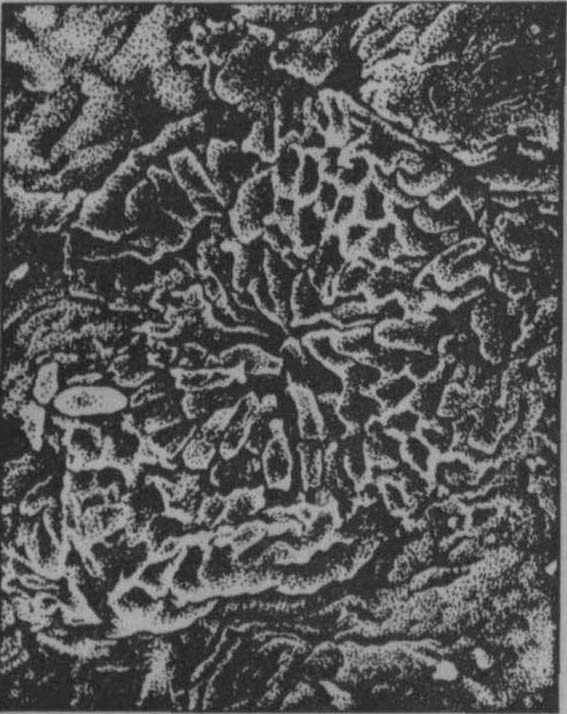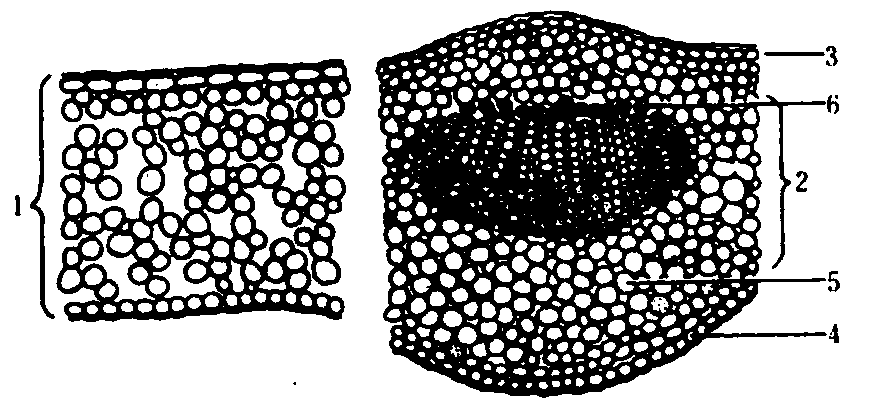茶树叶片tea leaf
茶树的营养器官之一, 是进行光合作用、呼吸作用、蒸腾作用的主要器官, 是制作饮料茶叶的原料。
茶树叶片的形态 叶起源于营养芽的叶原基, 由叶片和叶柄组成,为不完全叶。在枝条上为单叶互生,着生的状态依品种而异, 有直立的, 半直立的, 水平的, 下垂的四种。直立状的叶片几乎紧贴枝条, 半直立状的,叶片与枝条成45°左右的角, 水平状和下垂状的与枝条所成的角度更大。在同一枝条上, 上部新生叶较直立, 随着叶龄的增长, 自上而下, 叶片逐渐平展。同一株丛中, 树冠面上的叶片较直立、树冠内的叶片较为平展。生长定型的叶片, 以其叶长与叶宽之比来分类, 凡叶长宽比在2以下者, 为圆形叶, 2~2.5之间的为椭圆形叶, 3以上者为披针形叶。生产茶园中以椭圆形和长椭圆形叶的茶树居多。叶面有革质, 具光泽,较平滑,也有隆起的。叶面曲度,有沿主脉向上呈一定角度折叠的, 有平展的, 少数品种也有向叶背翻转的。叶背无革质, 较粗糙, 有气孔, 气孔是茶树体内外气体交换的通道, 大叶种气孔数少而大, 小叶种气孔多而小。在嫩叶的背面被覆着银灰色或淡黄色的茸毛(即表皮毛), 茸毛的周围环绕有微小而密集的腺细胞, 分泌出芳香油, 茸毛的多少常常作为鉴别品种性状的依据。随着叶龄的增长, 茸毛逐渐脱落, 老叶茸毛尽失。

图1 茶树叶片
茶叶的叶脉为网状脉, 由叶柄引伸的叶脉, 顺叶片中央直达叶尖的为主脉(或称中脉), 由主脉分出许多的小叶脉为侧脉, 侧脉又分出许多细脉。主脉在叶的正面不显露, 并稍微凹下, 在叶背凸起; 侧脉从主脉上成对分出,一张叶片多的有10~15对,一般有7~8对, 少的也有5~7对的; 侧脉与主脉成45°或45°以上的角度向叶的边缘延伸,到叶缘的2/3处呈弧形向上弯曲, 并与上一侧脉连结, 组成一个闭合的网状输导系统。这是茶树叶片的重要特征之一, 叶脉有支持叶子的伸展和输导水分、营养物质的功能(图1)。
茶叶叶片的边缘, 有平展的, 也有呈波浪式皱折的, 还有向背翻转的。成熟叶片的叶缘有锯齿, 平滑无毛, 锯齿深浅, 疏密不一, 一张叶片有锯齿16~32对不等, 锯齿尖端有腺细胞, 腺细胞脱落后, 留下褐色疤痕。叶尖形状常为茶树分类的依据之一, 有长而锐达10~12毫米的, 有短而锐仅1~10毫米的,因而可分为锐尖、钝尖、圆尖三种。
茶叶叶基, 有狭长的, 也有圆形的。叶片与枝条连结的部分为叶柄, 茶叶的叶柄短, 只有2~12毫米,叶柄起输导和支持叶片的作用, 还调节叶片接受光源的位置。在完成一个生活周期以后, 叶片连同叶柄从枝条上脱落,而在茎上留下叶痕。叶质在同一枝条上,嫩叶柔软, 老叶硬脆。叶片厚度, 一般为0.3~0.4毫米, 大叶种叶片薄而软, 中小叶种则厚而硬脆。叶色有浓绿、淡绿、黄绿等不同, 嫩叶呈黄绿色, 叶片越成熟, 叶色越浓。叶的长度, 长的有25厘米, 短的只有3厘米(甚至更短)。叶面积计算通常采用日本人田边贡的公式:
叶面积(平方厘米)=叶长×叶宽×0.7(系数)以成熟叶为标准,凡60平方厘米以上的为特大叶,40~60平方厘米之间的为大叶, 20~40平方厘米之间的为中叶, 20平方厘米以下的为小叶。
叶片结构 茶叶是属典型的双子叶植物背腹叶,具上下表皮层,叶肉组织和形成叶脉的维管束组织,从叶片横切面上从上到下可清楚看到, 上表皮由一层密接的长方形细胞外壁覆被角质膜, 一般野生茶的角质膜为4~5微米,蜡质式样有各种图案(图2),小叶种表皮细胞较小,细胞壁较厚,这是抗寒力较强的表现;大叶种则表皮细胞较大, 细胞壁薄, 弯曲度小, 抗寒力较差。嫩叶的角质层薄, 散失水分就多, 叶片成长过程中角质层渐次增厚, 蒸腾水分就少。下表皮茸毛密铺叶背, 茸毛多往往是优良品质的标志之一, 叶片渐长, 茸毛脱落, 茸毛周围环绕微小而密集的腺细胞, 可分泌芳香油和防止过分蒸发。着生毛的基部为基细胞,基细胞的多少, 品种间极不一致。下表皮密布气孔, 气孔大小和同一单位面积上气孔数目的多少, 因品种而异, 一般大叶种的气孔数少而大, 小叶种多而小(图3)。气孔表面覆盖一层角质层, 显示出凸出表面。野生茶树的护卫细胞多于栽培茶树,这也是原始茶树的特征之一。上、下表皮之间为叶肉组织和形成叶脉的维管组织。叶肉组织具有两种细胞形态, 一种是长柱形的, 排列紧密, 状似隔栅,故称为栅栏细胞;另一种是多面形的, 细胞有较大的间隙, 似海绵状疏松, 故称为海绵细胞。茶叶的海绵细胞中有草酸钙沉淀而形成梅花状的晶簇, 这在幼叶中极少见到。在叶肉有的可见到由厚角细胞组成、形态各异的支持组织,称为石细胞, 具有分类上的意义。石细胞的形态常随品种而异, 通常有不具分枝的线形石细胞和具分枝的石细胞, 分枝的有树枝状、星状、骨头状、棒状等,茶叶主脉中的维管束部分, 有木质部, 韧皮部, 其外面包围着环状的由1~3层厚角细胞组成的机械组织,成“V”形, 因此主脉向背面凸(图4)。

图2 云南大黑山野生茶树叶片
表皮细胞外表面蜡质花纹(电镜200倍)

图3 祁门种茶树叶片
下表皮细胞气孔(电镜2250倍)

图4 茶树叶片内部结构
茶树叶片的变异 茶树的器官中变异最显著的是叶片,人们常常把叶片作为鉴别品种的重要依据之一。在同一地理条件下, 由于日照条件不同, 海拔高度不同, 茶树叶片结构上、形态上则明显地出现变异。在遮荫条件下, 接受的是漫射光, 叶片大而薄, 叶面平展, 呈水平状着生于枝条上, 栅栏细胞层次少, 海绵细胞多(图5), 内含叶绿粒大; 在直射光的照射条件下, 则叶片变小而叶肉较厚,叶面内折,呈直立状或半直立状着生于枝条上, 栅栏细胞层次增多。茶树叶片的叶面积随着海拔的增高而变小, 叶片厚度则随着海拔的降低而变薄。在同一株茶丛中, 树冠面上的叶片较小, 丛内部叶片较大而薄; 在同一枝条上, 中段叶片比两端的要大些。老枝生长的叶片小而厚,幼年、青年期生长健壮枝条上的叶片以及从根颈部发生的枝条(亦称为徒长枝, 土蕻枝)叶片大而薄, 比较柔软, 制成毛茶, 品质良好。老年期茶树枝条上生长的叶片往往小而硬, 制成毛茶则较次。

图5 茶树叶片的叶内细胞(电镜5400倍)
对夹叶 茶树营养芽所分化的叶原基并没有完全发育为叶片, 过早地停止了生长而形成为驻芽, 称之为对夹叶,又叫对口叶、马口叶、对片叶、摊片、堆片。指的是新梢顶端“驻芽”邻近的、节间短、状似对生状态的两张叶片。驻芽出现后, 新梢的伸长就明显缓慢下来, 这种不正常的新梢一般只有2~3张叶片。
鱼叶 茶树新梢每次生长的头一片或几片的叶。叶色较淡, 厚而硬脆, 叶柄宽而扁平,侧脉隐而不显,叶缘为全缘或前端有锯齿,叶尖圆钝, 叶面积小于真叶。鱼叶是区分春梢、夏梢的标志, 鱼叶的解剖结构常见的是分化不完全,与一般叶片有显著不同(图6),主要是栅栏细胞与海绵细胞没有多大区别, 叶绿体甚少, 整个维管束小, 薄壁细胞占据主脉的大部分, 维管束的部位偏向于上表皮,仅出现少量的机械组织。鱼叶的发育不完全, 采茶时不要采摘,否则制成的毛茶,品质低下。

图6 茶树鱼叶内部结构
1. 叶肉部分(栅栏细胞与海绵细胞无区别)
2. 维管束部分 3. 上表皮 4. 下表皮
5. 薄壁细胞 6. 机械组织
鳞片 茶树营养芽外缠的特殊形态的变态器官,为茶树叶的变态,着生于营养芽的外面, 又称为鳞叶、芽鳞。起防止严寒侵袭和水分过分散失而保护幼芽的作用。鳞片质地粗糙, 褐色, 外具短硬而密集的茸毛和薄层腊质。它不能发育为典型的叶片。当生长期开始,芽体膨大即张开,当鱼叶展开时, 鳞片即脱落。秋冬形成的冬芽外面紧缠有3~5枚鳞片, 春夏季形成的夏、秋芽一般没有鳞片, 少数有1~2枚, 芽的保护作用由鱼叶代替。
茶树叶片
见“茶树”。